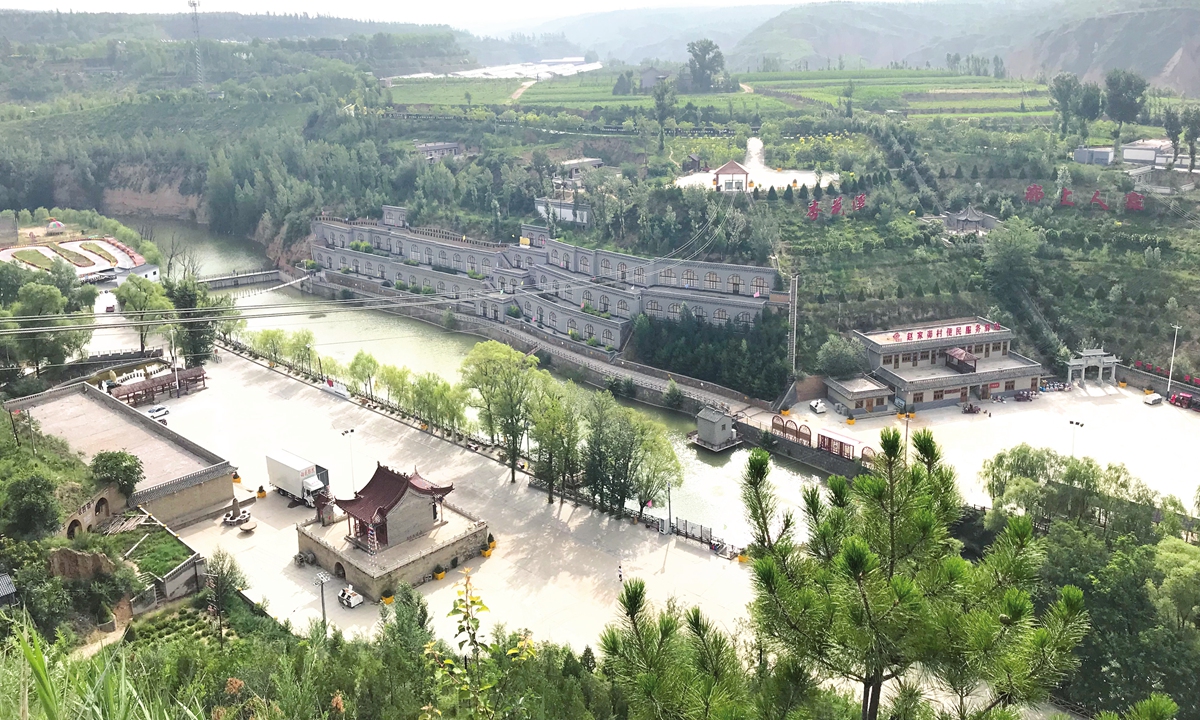
A view of Zhaojiamao's eco-tourism area (Photo: Global Times)
When asked about a rather vague question "what is your dream," 25-year-old Zhang Shuyao, a woman militia based in Yulin of Northwest China's Shaanxi Province, smiled shyly, and said, "I do not have an ambitious dream, I just want to stay here and do my job well."
"In Yulin, the story of the women's militia is known to households. We all grew up with their heroic afforestation stories," Zhang told the Global Times with pride on her face as she is now part of them.
Zhang joined the battalion four years ago after graduation from university. She could have found a job in provincial capital Xi'an, which has wide streets, skyscrapers, fancy restaurants and bars and large shopping malls, but chose to return to her hometown Yulin on northern Shaanxi's yellow earth plateau, to carry on the mission inherited from previous generations.
The Bulanghe women's militia battalion was established in 1974 when Bulanghe township was at the border of desert and human residence. In that year, 54 female militias, 18 years old on average, came to the township, 80 percent of which covered by sand, to build up a green great wall to prevent sand and winds from corroding the city.
Living in cottages built from bushes and dirt, on highland barley buns, the first generation started a four-decade project and turned the desert into grasslands and forests. The 33 tree belts, 35 kilometers of irrigation channels, 36 wells, 800 vanished sand dunes, marked the sweat and youth of generations of militias. The border of greenness was pushed northward 400 kilometers and the Maowusu desert almost disappeared on satellite images.
An old saying in Yulin was "[There are] two winds a year, each lasts half a year." The militia predecessors painted the first green here, "we are standing on their shoulders. What we do is incomparable to their efforts and achievements," Zhang said.
The battalion now has 54 active members and 9 are stationed at the headquarters, including Zhang. Their dormitory, built with brick and equipped with air conditioners, is next to the reconstruction of the first-generation simple cottage.
"The sheer contrast reminds me every day that I should work hard on my post, pass on the pioneers' spirit and contribute to building the township into a better place," Zhang said.
Zhang and her fellow's daily jobs are to patrolling the forests, seedling care, pruning and replanting if necessary. Zhang is also the guide at a museum commemorating the militia battalion, where she tells moving stories of the heroines to tens of millions of visitors to Bulanghe, which has explored a path of eco-tourism.
It is based on predecessors' afforestation, which changed the micro climate that verbena and cosmos can survive in Bulanghe. The extensive flower fields are operated by a tourism company and Zhang looks forward to welcoming tourists to return in large amounts after the epidemic.
"There are enough young people living in those major cities. And Bulanghe needs me," Zhang said.
Another person who made a similar decision to Zhang is Zhao Shuaishuai, village chief of Zhaojiamao village where he was born and grew up.
Before returning to the small village, Zhao was a civil servant at health authority of Yuyang district in Yulin. But he decided to leave the "decent" job and return to the small village to figure out a sustainable path out of poverty and toward prosperity for his countrymen.
The village also pioneered a shareholding mechanism to operate village's collective properties, with which the deserted farmlands (caused by youth drainage) were transformed into fruit forests and backyard animal husbandry was upgraded to collective husbandry. The collective properties were managed by a village board and villagers are stock holders.
After the ecosystem was repaired and rural economy started to run robustly, Zhao and the village board decided to develop rural tourism - which is of higher profit margins than agriculture. Tourists can enjoy rural scenery and flower blossoms, pick fruits, barbecue outdoors or row a boat in the river.
The village, located along a hilly slope, also made use of its landscape to build super-long slides and a glass bridge, "which are popular among tourists" in holidays.
One can hardly tell Zhao belongs to the post-90 generation from his sun-tanned skin and wrinkles, which are "medals" for his time and efforts spent in Zhaojiamao village.
"No one lives in the traditional cave dwellings. We built a 'new village' for everyone just over there," Zhao pointed to a batch of red-roof structures on the other side of the river. Power, tap water, gas and internet... "Everything," Zhao grinned.
"I am glad to see more and more young people stay. They can find a job, like a sightseeing car driver or a teller for entertainment activities. The income may be not as good as in big cities but they can take good care of the elderly," Zhao said.
If the elderly has no children or grandchildren to take care of them, the elderly's home will assume the responsibilities. People aged above 65 can choose to live in brick houses with free catering and convenient medical services.
Zhao's father was a board member of the village in the journey to rip off the label of "poverty-stricken village." Now, Zhao assumed his responsibility of leading the people to a more affluent and prosperous life.
Each generation has its own mission. For some, it means to seek a living in major cities and to pursue a successful career, but for Zhang and Zhao, and many other Generation Z, the mission is to go back to their relatively backward and less developed hometowns, contribute their youth, energy and vision into local development.
Generation Z in China, which previously described as a "spoiled" generation as they grow up in booming consumerism and overwhelming online information, however, is sprinkling sweat in the country's great cause of rural revitalization.


